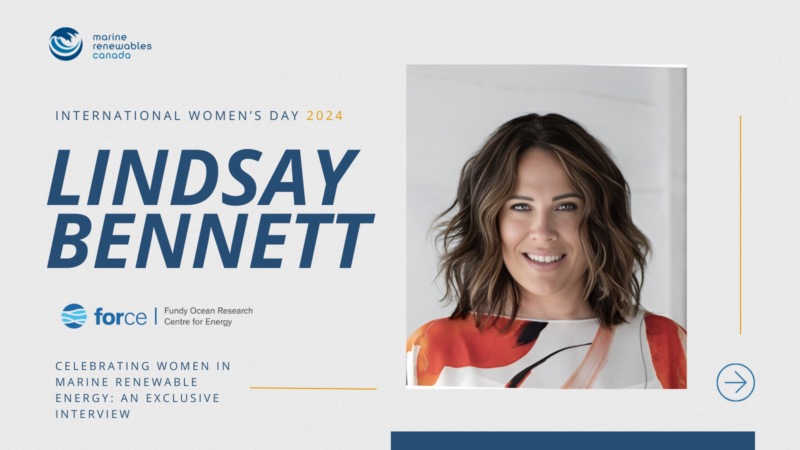Celebrating Women in MRE: An Interview with Lindsay Bennett

As we continue to celebrate International Women’s Day, MRC sits down with Lindsay Bennett, the executive director of Fundy Ocean Research Centre for Energy (FORCE). With her extensive experience and dedication to sustainable marine energy projects, Lindsay shares insights into her journey, the importance of diversity, and some of the ongoing obstacles women face in the marine renewable energy (MRE) sector. Over the past eight years, Lindsay has dedicated herself to fostering collaboration among industry, governments, communities, academia, rights holders, and other partners to ensure the sustainable development of tidal energy projects in the Bay of Fundy.
A Journey of Purpose
Lindsay’s journey into marine renewable energy was fueled by a passion for the natural environment. Growing up, she developed a love for the ocean during summers spent exploring tide pools and coastlines in the Atlantic provinces. Her career trajectory took shape through her background in ecosystem management and organizational leadership. However, it was the opportunity to contribute to environmental stewardship that piqued Lindsay’s interest in tidal energy.
“I’ve always been very drawn to the natural environment,” Lindsay shares. “After studying ecosystem management and moving to Nova Scotia for work, I quickly realized that many of the skills I’d learned over my years as a competitive athlete and coach were transferable to the working world, and I knew I wanted to find a great outlet for that in a strongly innovative and purpose-driven organization.”
Reflecting on her journey, Lindsay shares, “A sense of purpose in my work became the driving force for my career.”
The Power of Diversity
Lindsay emphasizes the importance of embracing diverse perspectives and ideas, recognizing the unique ways in which women approach problem-solving and leadership.
“In almost every facet of life, I think it’s worth the extra time and effort to embrace diversity,” Lindsay emphasizes. “Women often tackle problems and lead in distinctive ways, fostering collaboration and empathy.” She cites examples of inclusive approaches that have led to better outcomes within MRE projects, highlighting a collaborative and empathetic leadership style often exhibited by women that drive innovation and progress in the sector.
Lindsay notes, “An inclusive approach sometimes means slowing down a little bit and taking a beat to make sure everyone can contribute.”
Overcoming Obstacles
Despite strides towards gender equality, obstacles continue for women in MRE and STEM fields. Lindsay identifies the underrepresentation of women as an ongoing challenge, emphasizing the importance of positive role models and increased education to challenge stereotypes.
“The underrepresentation of women in STEM, in the board room, and in the C-suite continues to be an obstacle,” Lindsay acknowledges. She advocates for the visibility of women in leadership roles, believing that representation is crucial for inspiring the next generation of women in marine renewable energy.
Furthermore, Lindsay highlights the need for greater awareness of the attributes and skills that women bring to the workforce. She challenges stereotypes and promotes a culture where vulnerability is embraced as a strength rather than a weakness. “Expressing vulnerability in the workplace can be controversial,” Lindsay acknowledges, “but studies show that it can lead to positive outcomes and stronger relationships.”
In celebrating International Women’s Day, Lindsay’s insights highlight how purpose-driven leadership, diversity, and inclusive practices can lead to a more sustainable and equitable future for marine renewable energy and beyond.
